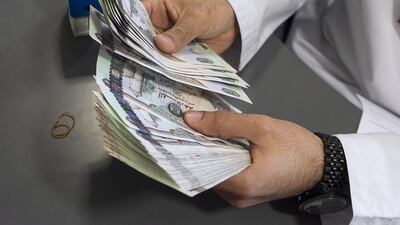Compliance costs for banks in the Middle East are soaring, as a global crackdown on money laundering and higher international capital requirements squeezes their resources, a new report from Thomson Reuters said.
Four out of five financial services companies in the Middle East polled by Reuters said that they expected compliance costs to rise over the next year.
Major regulatory changes are leading banks to take on more compliance staff, experts said.
They include the implementation of the US Dodd-Frank Act, a major legislative response to the 2008 subprime mortgage crisis, updates to the Foreign Account Tax Compliance Act, and a new global standard of risk management, the Basel III accords, that requires banks to hold more high-quality capital as a buffer against losses.
Greater enforcement of the Anti-Money Laundering Countering the Financing of Terrorism Act (AML-CFT), a US measure to ensure that bank funds do not end up in terrorists’ bank accounts, also means that the UAE’s banks must be particularly careful to scrutinise their international payment systems.
“These are increasing banks’ compliance costs by very large amounts,” said Nasser Saidi, the former Lebanese finance minister and former chief economist at the Dubai International Financial Centre.
“The trouble is that banks not only have to invest in resources and the human capital side, which is expensive, but you simply don’t have enough people with the right training in the region.”
Because UAE banks clear large volumes of trades in dollars through New York, they are forced to follow US rules – meaning that recent changes in America are hitting lenders here.
“A bank can become liable if suddenly the justice department determines that you have allowed payments for a non-US company that happens to be on a terrorist list,” said Mr Saidi. “This can be quite expensive.”
A legal precedent was set last September when a jury found Amman-based Arab Bank liable for damages in a New York court for providing financial assistance to Hamas. Arab Bank is appealing the verdict.
In the UAE, a tightening of Central Bank rules on lending has further created demand for trained compliance officers. Personal loans and mortgages have both been capped, while new technical measures for balance sheet and treasury management have made compliance officers' jobs more complicated.
“Stricter lending standards and new regulations in terms of retail loans have been introduced in the UAE,” said Jaap Meijer, an equities analyst at Arqaam Capital in Dubai.
“Capital management is now more sophisticated – requiring more frequent updates on liquidity and mismatch positions [differences in the maturities of securities held on a bank’s balance sheet].”
abouyamourn@thenational.ae
Follow The National's Business section on Twitter

